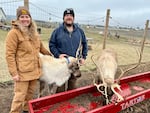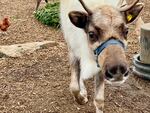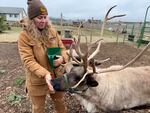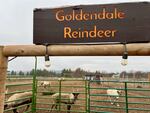
Tanya Clarke and Daniel Connell own and operate Goldendale Reindeer Farm, which has nine reindeer.
Courtney Flatt / Northwest News Network
The reindeer at Goldendale Reindeer Farm do more than dash through the snow — they play their games, of course, and snuggle with their owners.
It’s feeding time at the small farm just outside the Columbia River Gorge. While this year’s crop of reindeer trainees waited for lunch, they played, tossing a small Christmas tree with their antlers in the pasture. They also couldn't resist eating out of their caretakers’ hands.

The reindeer like to play with small Christmas trees by moving them around with their antlers.
Courtney Flatt / Northwest News Network
“They know we’ve got some goodies,” said owner and caretaker Tanya Clarke, as she opened the gate.
Clarke and her husband, Daniel Connell, let children visit with Santa and their nine reindeer. Coincidentally, that’s the same number that Santa has guiding his sleigh.
“I think a couple of them may be chosen for Santa’s team this year. We'll have to see what happens on Christmas Eve,” said Clarke jokingly.
Two of this year's newest additions to the herd, Cedar and Carliese, knew the green scoop Clarke had in her hand. It was full of barley and oats.
She poured some in her hand and a furry, reindeer snout quickly appeared. Reindeer, known as caribou in the wild, are the only mammals that have furry snouts. The young ones munched and munched and munched but still wanted more.
“Reindeer kisses,” Clarke laughed, referring to the way they gently ate food out of her hand. “It’s just the sweetest thing.”
Besides handfuls of oats and barley, the nine reindeer living at the Goldendale farm also chow down on reindeer candy, also known as beet pulp, and reindeer kibble. Now, Purina makes the special reindeer grub, delivering it to a feed store in Goldendale, Connell said.
The herd’s appetite varies with the season, Clarke said. In the spring and summer, when the reindeer are growing antlers and babies, the herd eats about 100 pounds of reindeer kibble per day, 10 gallons of beet pulp and a side of orchard grass hay. In the winter, they drop about 10 to 15% of their body weight, she said, eating about half the amount of food.
Clarke poured a Home Depot bucket full of beet pulp into a red trough.

Tanya Clarke feeds oats and barley from her hand. "Reindeer kisses," she calls it.
Courtney Flatt / Northwest News Network
“It’s a byproduct of the sugar beet industry,” Connell said. “For the animals, there’s a little bit of sweetness in it. It’s roughage for their guts. They love it. We’ve tried tasting it – it kind of tastes like dirt.”
These reindeer will grow to about 300 pounds once they are fully grown. While male and female reindeer grow antlers, only gals keep their points through Christmas. So, all of Santa’s reindeer are ladies.
Christmas song enthusiasts probably know the lyrics: “Up on a housetop: click, click, click.” What they may not know is that reindeer sound isn’t magic. It’s biology.
At the farm, there’s one thing you couldn’t miss as the reindeer saunter by: the clicks.
“They have a tendon that crosses their sesamoid bone in their foot, and with every step they take, they make a click,” Clarke said.
Scientists said the noise might help keep the herd together, especially in snow and fog — with or without Rudolph.
In the last two years, Clarke and Connell said they have learned a lot about biology and animal husbandry.
Caring for a herd of nine reindeer takes a lot of work: feeding hundreds of pounds of food, removing waste properly and making sure the animals are happy and healthy.
Before 2020, the couple lived in California, working as emergency room registered nurses. They had one particularly bad night, Clarke said, so they decided they needed more joy in their lives.
“When you work in the ER and you see a lot of sadness, then you come here and you see all that joy. It really makes it worthwhile,” Clarke said.
She said she first became obsessed with the merry animals while helping her mother recover from hip surgery. Clarke wrote a more challenging, but nice, checklist for her mom to complete while healing. The final step: walking on uneven ground around large animals.
So, Connell flew to Washington, and the family ventured to the Leavenworth Reindeer Farm.
“It was just really magical, the first time we were ever there,” Connell said. “It was just really peaceful to be around all the reindeer. They were so close and up close and personal. It was really special for us.”
Then, it was all reindeer all the time for Clarke — from collecting stuffed animals to curating social media feeds.

There are now nine reindeer at the Goldendale Reindeer Farm.
Courtney Flatt / Northwest News Network
That eventually led to the couple’s big change — and by big, that’s about 300 pounds per adult reindeer. Before that decision, they’d never owned large animals, Clarke said. They now own and operate the reindeer farm on top of their night shifts at a local hospital.
The couple leads private tours, including their rabbits and chickens. The couple and their beloved animals also host events during the holiday season.
They say mentors across the state and across the country have taught them a lot about reindeer husbandry. While reindeer farms aren’t a huge industry, they say their dreams are big — and they hope to grow their Goldendale herd from nine to 24.
A larger herd is Clarke’s dream, at least. Her husband said he’s counting dollars, especially food costs.
“I look at it from a business standpoint. She’s looking at it from how fun it would be,” Connell said.
These two years have meant a lot of firsts for the couple, such as this year’s calving season. While it was stressful, Clarke said it was her favorite time of the year, like something out of a Disney movie, she said.
“Reindeer babies stand within one hour of birth. They walk shortly after that,” Clarke said. “By the second day of life, they run faster than a sprinter. So it's really just amazing to see this long legged baby reindeer just running like crazy.”
This April, the herd grew by three babies, Cedar, Ollie, and Carliese, who was named after the two veterinarians who delivered her. The couple knew there was trouble and called the local vet at 4 a.m.
“‘He said, ‘We might be in trouble here, guys,’” Clarke said of Carliese’s delivery.
In a rarity in the reindeer world, the vet had to deliver Carliese by C-section. He didn’t expect her to live but she did. Clarke called the 8-month-old her “miracle baby.”
“She got up, wanted to nurse her mom right away. She was our biggest one. She was super strong,” Clarke said.
They’ll find out which reindeer are pregnant now about the first week in January, she said.
“I love their curious nature,” Clarke said, as Cedar nosed into this reporter’s gear bag. “She’s just saying, ‘What are you doing? What do you got there?’”
Each reindeer has its own personality, from curious to introverted, Clarke said.
“They just seem to have old souls,” Clarke said.
That makes sense — reindeer have been an integral part of Santa’s Christmas Eve visits forever.